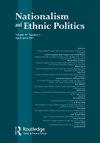民族构成与民主价值观:1995-2014年公民民主愿望的全球考察
IF 1.1
Q3 ETHNIC STUDIES
引用次数: 1
摘要
关于民众对民主的支持有着丰富的文献。然而,很少有人调查种族构成与公民对民主的渴望之间的联系。在这项研究中,我们调查了1995-2014年期间91个国家的民族分割化与民主态度之间的关系。我们通过衡量公众对民主的渴望来检验这一点。主要自变量为时变民族分置指数和民族极化指数,基于宗教族群构成项目的时间序列数据。我们利用结合国家和个人层面数据的分层模型来弥补研究中的这一差距。主要的发现是,同质社会显示出对民主社会的最大程度的渴望,而日益加剧的分化,特别是两极分化,则与对民主的较小渴望有关。本文章由计算机程序翻译,如有差异,请以英文原文为准。
Ethnic Composition and Democratic Values: A Global Investigation of Citizens’ Desire for Democracy, 1995–2014
Abstract There is a rich literature on public support for democracy. However, few have investigated the link between ethnic composition and citizens’ desire for democracy. In this study we investigate the relationship between ethnic fractionalization and democratic attitudes in 91 countries in the period 1995–2014. We test this on a measure of public desire for democracy. The main independent variables are a time-variant ethnic fractionalization index and an index of ethnic polarization, based on time-series data from the Composition of Religious Ethnic Groups project. We make use of hierarchical modeling combining country- and individual-level data in order to approach this gap in the research. The main finding is that homogeneous societies show the largest degree of desire for a democratic society within established democracies while increased fractionalization and especially increased polarization is associated with a smaller desire for democracy.
求助全文
通过发布文献求助,成功后即可免费获取论文全文。
去求助
来源期刊

Nationalism and Ethnic Politics
ETHNIC STUDIES-
CiteScore
1.30
自引率
0.00%
发文量
30
期刊介绍:
Nationalism & Ethnic Politics explores the varied political aspects of nationalism and ethnicity in order to develop more constructive inter-group relations. The journal publishes case studies and comparative and theoretical analyses. It deals with pluralism, ethno-nationalism, irredentism, separatism, and related phenomena, and examines processes and theories of ethnic identity formation, mobilization, conflict and accommodation in the context of political development and "nation-building". The journal compares and contrasts state and community claims, and deal with such factors as citizenship, race, religion, economic development, immigration, language, and the international environment.
 求助内容:
求助内容: 应助结果提醒方式:
应助结果提醒方式:


